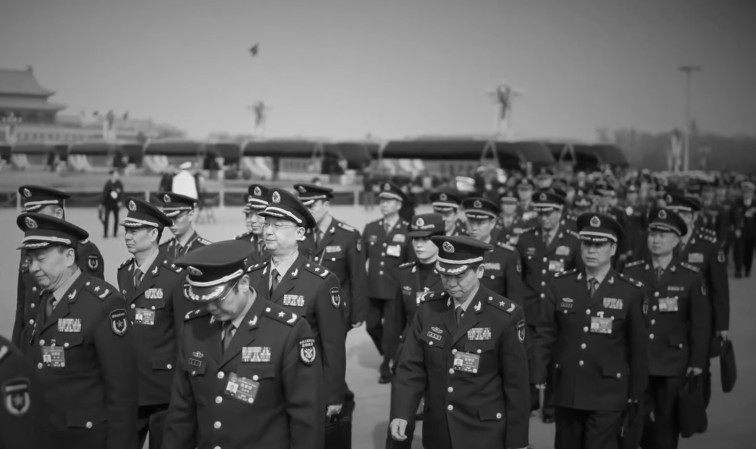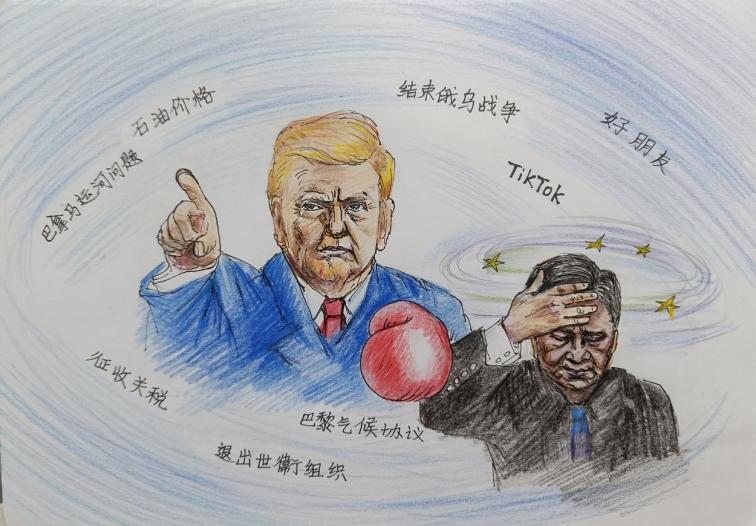On October 27, 2023, a large screen on a street in Beijing displays the obituary of Li Keqiang. (Wang Zhao/AFP via Getty Images)
[People News] Recently, People’s Report received an explosive disclosure from a mysterious insider using the pseudonym “Nothing More to Say,” who detailed the full process of the alleged assassination of former Chinese Premier Li Keqiang. The insider claims that under orders from superiors, he was part of a six-person team executing a mission coded “23107.” The group used a substance known as “Cardio-Disruptor”, which was added to Li Keqiang’s drinking water before he went swimming, to induce an irreversible cardiogenic disorder, mimicking the symptoms of a sudden myocardial infarction. After Li collapsed from cardiac arrest, the team staged a mock emergency response and transported him to Shuguang Hospital Pudong Branch, where he was pronounced dead. The hospital, the insider claimed, had been pre-selected for this purpose.
Assigned to a Covert Mission
The whistleblower says he worked in logistics support in Beijing. On July 3, 2023, he received an assignment from Coordination Unit 7. The mission's objective: to terminate Li Keqiang’s life within a controlled timeframe, crafting a medical conclusion that would officially attribute his death to “sudden myocardial infarction.”
The mission code “23107” designated it as a special operation. All members were strictly ordered to maintain secrecy. No written documentation was allowed; all passwords and instructions were delivered in segments.
The mission was carried out by a six-person team. The whistleblower said he was just one of the ordinary executors. Looking back, he said he had very little choice at the time—he simply followed orders from his superiors and had no room for personal discretion throughout the entire process.
The six-person task force had clearly defined roles:
-
Li XX (Team Leader) – Oversaw full execution of the operation.
-
Chen XX (Aftermath and Cleanup) – In charge of cleanup and ensuring zero information leaks.
-
Zhao XX (Signal and Video Control) – Managed signals and recordings to prevent any data capture.
-
Sun XX (Perimeter Control & Traffic Interference) – Handled external lockdowns and traffic disruptions.
-
Zhou XX (Medical Backup) – Managed emergency response logistics and contingency plans.
-
The Insider (Timing Coordination & Evidence Replacement) – Ensured timely actions and swapped potential evidence.
Use of Military-Grade Experimental Drug
According to the insider, the substance used was code-named “Cardio-Disruptor” (CD-1)—a military experimental drug provided by a state laboratory under the National Medical Products Administration. It was in liquid form, odourless and colourless, making it indistinguishable from regular water. Upon ingestion, it swiftly disrupted the heart’s electrical activity, causing ventricular fibrillation and ultimately heart failure.
The drug's standout feature: high concealment. It could not be detected in routine toxicology tests, left almost no metabolic residue, and didn’t impact liver or kidney function, making it nearly impossible to trace even through autopsy. Its effects began within 30 minutes after ingestion, a timeline that had been rigorously tested.
Pre-Mission Training
From July 10 to October 15, 2023, the six-man unit underwent intensive training at a classified facility in a southwestern area under the Academy of Military Medical Sciences. Training included: Drug reaction timing and emergency protocols; Simulated cardiac arrest and rescue; Faked medical alerts and emergency cover; Video delay sync technology; Fake physiological data creation and device trace manipulation; Scene reconstruction and escape route planning.
The team conducted 42 full-scale simulations. The insider emphasised that the training was to ensure synchronised execution, psychological readiness, and preparedness for any emergencies.
The Operation
On October 26, per schedule, Li Keqiang entered the indoor heated swimming pool of Building 3, Dongjiao State Guesthouse. The pool was at 26°C, indoor temperature was 25°C.
At 10:50, 0.5 ml of CD-1 was mixed into a 330 ml glass of water. The glass was placed on Li's usual poolside table.
Two delivery methods were prepared: direct injection behind the ear or oral ingestion. The team chose the latter.
At 11:22, Li drank the water and began swimming. As per routine, he swam a lap per minute. By 12:00, his movements visibly slowed, and he eventually stopped, floating lifeless.
At that point, the insider and Li XX jumped into the water for a staged rescue, while Chen XX began CPR and Zhao XX disabled the signal feeds and video streams.
At 12:08, as preplanned, they called emergency services reporting “chest pain and unconsciousness,” and Li was taken to Shuguang Hospital Pudong Branch.
The whistleblower stated that, as part of the plan, they had already made arrangements to rule out Zhongshan Hospital, Ruijin Hospital, and Renji Hospital affiliated with Shanghai Jiao Tong University School of Medicine. Some of the specialists at these hospitals had either received prior appointment requests or had been transferred in advance.
At 12:23, Li arrived at the hospital. ER team, led by Dr. Huang Jinsong, took over. Cardiologist Dr. Lin Xiaoqing initiated ECMO, and Head Nurse Zhang handled intubation. Deputy Director Chen X-An signed emergency procedure approvals.
At 12:31, despite two rounds of defibrillation and epinephrine, Li did not recover.
Official time of death: 12:10 a.m. (October 27). Public cause of death: “Acute cardiogenic sudden death.”
Post-Mission Cleanup by Multiple Agencies
At 1:50 a.m., Ministry of State Security (MSS) agents arrived, scanned the scene, and issued a preliminary “zero-leakage” report to the Central State Security Commission (CSSC).
At 2:10, the Ministry of Public Security Cyber Division deployed data erasure tools, wiping smart locks, pH monitors, and temperature control logs.
At 2:20, State Administration of Radio and TV’s InfoSec Center deleted 9 internal records, 3 medical summaries, and 2 ICU video clips, replacing them with forged data.
At 3:10, Shanghai Police's Info Division managed hospital staff statements, invoked “Emergency Confidentiality Regulations,” and conducted one-on-one interviews to ensure narrative consistency.
At 2:40, special police entered Li’s locker and sprayed biological enzyme mist to erase all traces, planting false evidence.
At 4:05, the Mission Command Center (MTC) held a debrief, proposing a “48-hour completion” efficiency improvement.
At 4:40, all personnel withdrew. Documentation was filed with the National Secrets Archive (North Zone 4) with a 30-year top-secret seal.
Xi Jinping Oversaw the National Security Apparatus
Among the multiple departments involved in the cleanup, the National Security Commission (NSC) was included. According to publicly available information, on January 24, 2014, the Chinese Communist Party (CCP) Politburo held a meeting and decided to establish the Central National Security Commission. The meeting determined that the NSC would be chaired by Xi Jinping, General Secretary of the CCP, with Politburo Standing Committee members Li Keqiang and Zhang Dejiang serving as vice chairmen; and Director of the General Office of the CCP, Li Zhanshu, concurrently serving as Director of the NSC Office. Several standing and regular committee members were also appointed under the commission.
Other involved departments include the Ministry of Public Security, whose minister is Wang Xiaohong—an old subordinate of Xi Jinping from his time in Fujian—considered to be Xi's most loyal "knife wielder" (enforcer).
The Information Security Centre of the National Radio and Television Administration reports to the Central Propaganda Department. Its head, Li Shulei, is a trusted aide and key speechwriter for Xi Jinping. It is said that some of Xi’s speeches were written by Li himself.
According to the CCP’s regulations on the classification and management of state secrets, information classified with a 30-year confidentiality period falls under the "top secret" category. Matters of this level are defined as the core parts of confidential content that must be kept absolutely secret within a specified period and scope. If leaked, they could cause severe harm and major losses to the Party and the nation.
The insider claimed he was relocated to Myawaddy (Myanmar) after the mission.
He ended his statement saying: “Do I feel guilty? Yes. But I am just a grain of sand in the desert; it’s the wind, not the sand, that determines the direction.”
On October 27, 2023, former Chinese Premier Li Keqiang, who was residing at the Dongjiao State Guesthouse in Shanghai, suddenly suffered a heart attack while swimming and died despite resuscitation efforts. He was only 68 years old. Li Keqiang became the youngest former premier to die in office in the history of the Chinese Communist regime. As a top CCP leader, Li had access to a top-tier medical team monitoring his health around the clock, and he was in his physical prime. His sudden death sparked widespread suspicion. The suspicions were directed at CCP General Secretary Xi Jinping, who had long held divergent views from Li on governance. Although there are numerous suspicious points surrounding his death, there is still no conclusive evidence to call it an "assassination."
In May 2020, during the "Two Sessions" (annual meetings of China’s top legislative and political advisory bodies), Li Keqiang publicly stated that "600 million people in China have low or lower-middle incomes, with an average monthly income of only around 1,000 yuan." This directly contradicted Xi Jinping’s narrative of having achieved complete poverty eradication. Just two days before stepping down as Premier (on March 3), during his final farewell to State Council staff, Li Keqiang unexpectedly remarked with a smile: “Heaven is watching what man does; the heavens have eyes!” — a statement widely interpreted as a veiled critique of Xi Jinping.
On June 2, former Vice Chairman of the Central Military Commission Xu Qiliang also died of a heart attack while jogging. Just two days before Xu's death was officially announced, on May 31, Chinese journalist Zhao Lanjian revealed on the X platform that Xu Qiliang had already died of a heart attack in the early hours of May 28, 2025. Zhao claimed that Xu had been under immense mental pressure and had suddenly collapsed in a state of panic. Since his death was leaked two days in advance, many have begun to suspect that Xu Qiliang may be a “second Li Keqiang.”
(Originally published by People News)











News magazine bootstrap themes!
I like this themes, fast loading and look profesional
Thank you Carlos!
You're welcome!
Please support me with give positive rating!
Yes Sure!